PEP六年级上册四会单词词汇表
pep英语六年级上册Unit 3四会单词及句子

Unit 3next week 下周[nekst] [wi:k] this morning 今天上午[ðis]['mɔ:niŋ]this afternoon 今天下午[ˌɑ:ftə'nu:n]this evening 今天晚上['i:vniŋ] tonight今晚[tə'nait]tomorrow明天[tə'mɔrəu]take a trip去旅行[teik] [trɪp] read a magazine阅读杂志[ri:d] [,mægə'zi:n][ðə] [greit] [wɔ:l]go to the cinema 去看电影['sinimə] theme park 主题公园[θi:m] [pɑ:k] the Great Wall长城busy忙碌的together一起地[tə'geðə] comic book 漫画书['kɔmik] post card 明信片[post] [kɑrd]newspaper 报纸['nju:z,peipə]magazine杂志[,mægə'zi:n] dictionary词典;字典['dikʃənəri]shoe store鞋店[ʃu:] [stɔ:] buy 购买[bai]fruit stand水果摊[fru:t] [stænd]pet shop宠物商店[pet] [ʃɔp] need需要[nid]plant植物[plænt]else其他;另外[els]shop商店[ʃɔp]句子:What are you going to do on the weekend?周末你打算干什么?I’m going to visit my grandparents this weekend.这个周末我打算拜访我的祖父母。
(完整版)PEP六年级上册英语第2单元知识点
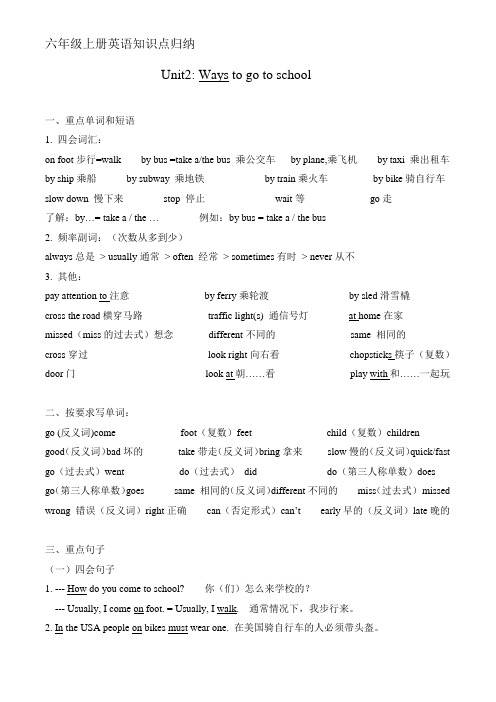
Unit2: Ways to go to school一、重点单词和短语1. 四会词汇:on foot步行=walk by bus =take a/the bus 乘公交车by plane,乘飞机by taxi 乘出租车by ship乘船by subway 乘地铁by train乘火车by bike骑自行车slow down 慢下来stop 停止wait等go走了解:by…= take a / the …例如:by bus = take a / the bus2. 频率副词:(次数从多到少)always总是> usually通常> often 经常> sometimes有时> never从不3. 其他:pay attention to注意by ferry乘轮渡by sled滑雪橇cross the road横穿马路traffic light(s) 通信号灯at home在家missed(miss的过去式)想念different不同的same 相同的cross穿过look right向右看chopsticks筷子(复数)door门look at朝……看play with和……一起玩二、按要求写单词:go (反义词)come foot(复数)feet child(复数)childrengood(反义词)bad坏的take带走(反义词)bring拿来slow慢的(反义词)quick/fast go(过去式)went do(过去式)did do(第三人称单数)doesgo(第三人称单数)goes same 相同的(反义词)different不同的miss(过去式)missed wrong 错误(反义词)right正确can(否定形式)can’t early早的(反义词)late晚的三、重点句子(一)四会句子1. --- How do you come to school? 你(们)怎么来学校的?--- Usually, I come on foot. = Usually, I walk. 通常情况下,我步行来。
六年级上册词汇表及常用表达法
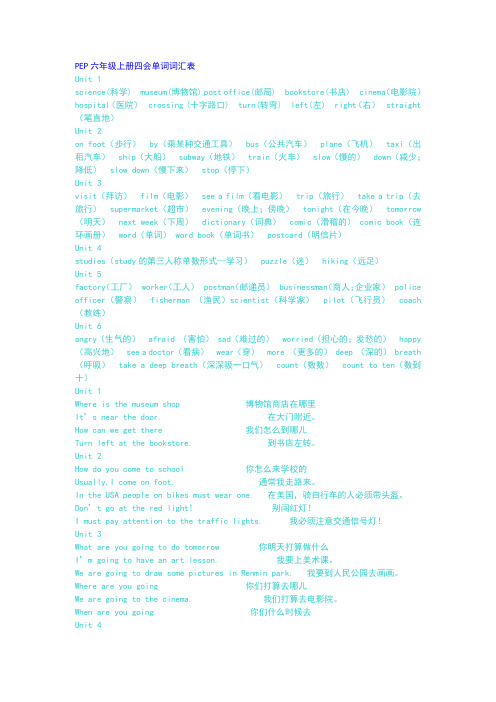
PEP六年级上册四会单词词汇表Unit 1science(科学) museum(博物馆) post office(邮局) bookstore(书店) cinema(电影院)hospital(医院) crossing (十字路口) turn(转弯) left(左) right(右) straight (笔直地)Unit 2on foot(步行) by(乘某种交通工具) bus(公共汽车) plane(飞机) taxi(出租汽车) ship(大船) subway(地铁) train(火车) slow(慢的) down(减少;降低) slow down(慢下来) stop(停下)Unit 3visit(拜访) film(电影) see a film(看电影) trip(旅行) take a trip(去旅行) supermarket(超市) evening(晚上;傍晚) tonight(在今晚) tomorrow (明天) next week(下周) dictionary(词典) comic(滑稽的) comic book(连环画册) word(单词) word book(单词书) postcard(明信片)Unit 4studies(study的第三人称单数形式—学习) puzzle(迷) hiking(远足)Unit 5factory(工厂) worker(工人) postman(邮递员) businessman(商人;企业家) police officer(警察) fisherman (渔民)scientist(科学家) pilot(飞行员) coach (教练)Unit 6angry(生气的) afraid (害怕) sad(难过的) worried(担心的;发愁的) happy (高兴地) see a doctor(看病) wear(穿) more (更多的) deep (深的) breath (呼吸) take a deep breath(深深吸一口气) count(数数) count to ten(数到十)Unit 1Where is the museum shop 博物馆商店在哪里It’s near the door. 在大门附近。
pep六年级英语上册第一单元复习资料
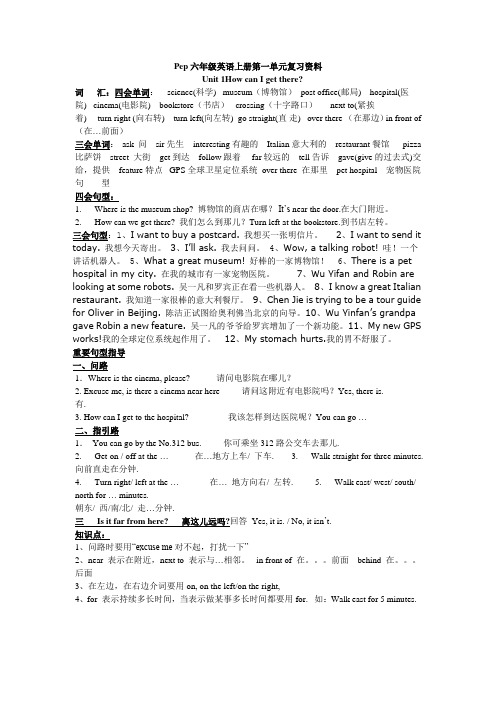
Pep六年级英语上册第一单元复习资料Unit 1How can I get there?词汇:四会单词:science(科学) museum(博物馆)post office(邮局) hospital(医院) cinema(电影院) bookstore(书店)crossing(十字路口) next to(紧挨着) turn right (向右转) turn left(向左转) go straight(直走) over there (在那边)in front of (在…前面)三会单词:ask 问sir先生 interesting有趣的 Italian意大利的 restaurant餐馆 pizza 比萨饼 street 大街get到达 follow跟着 far较远的 tell告诉 gave(give的过去式)交给,提供 feature特点 GPS全球卫星定位系统over there 在那里pet hospital 宠物医院句型四会句型:1. Where is the museum shop? 博物馆的商店在哪?It’s near the door.在大门附近。
2. How can we get there? 我们怎么到那儿?Turn left at the bookstore.到书店左转。
三会句型:1、I want to buy a postcard. 我想买一张明信片。
2、I want to send it today. 我想今天寄出。
3、I’ll ask.我去问问。
4、Wow, a talking robot! 哇!一个讲话机器人。
5、What a great museum! 好棒的一家博物馆! 6、There is a pet hospital in my city. 在我的城市有一家宠物医院。
7、Wu Yifan and Robin are looking at some robots. 吴一凡和罗宾正在看一些机器人。
pep小学英语6年级上册单词表

pep小学英语6年级上册单词表本文将详细介绍PEP小学英语6年级上册单词表,包括每个单词的发音、词性和释义等内容。
希望能帮助到学习英语的小学生们。
Unit 11. apple [ˈæpl] n. 苹果:一种水果,通常是红色或绿色的,有时带有黄色。
2. banana [bəˈnænə] n. 香蕉:一种长而弯曲的水果,外皮呈黄色,肉质香甜。
3. cake [keɪk] n. 蛋糕:一种甜点,由面粉、糖和其他原料制成。
4. grape [ɡreɪp] n. 葡萄:一种小圆形或卵圆形的水果,可以吃,也可以做酒。
5. hamburger [ˈhæmbɜːrɡər] n. 汉堡包:一种用烤肉饼放在面包中间制成的食物。
6. ice cream [aɪs kriːm] n. 冰淇淋:一种冷冻甜点,由牛奶、糖和调味料制成。
7. juice [dʒuːs] n. 果汁:水果榨出的液体,可供饮用。
8. milk [mɪlk] n. 牛奶:奶牛产生的白色液体,被用来制作奶制品。
9. noodle [ˈnuːdl] n. 面条:用面粉制成的长而细的食物。
10. orange [ˈɔːrɪndʒ] n. 橙子:一种圆形水果,有橙色的外皮和甜味的肉。
Unit 21. bread [bred] n. 面包:一种由面粉、糖和酵母制成的食物。
2. chicken [ˈtʃɪkɪn] n. 鸡肉:鸡的肉,通常用于烹饪。
3. fish [fɪʃ] n. 鱼:生活在水中的脊椎动物。
4. meat [miːt] n. 肉:可以作为食物的动物组织。
5. rice [raɪs] n. 米饭:一种由稻谷磨碎后制成的粮食。
6. tofu [ˈtoʊfuː] n. 豆腐:一种由大豆制成的食物。
7. tomato [təˈmeɪtoʊ] n. 番茄:一种圆形蔬菜,通常红色,在许多菜肴中使用。
8. vegetable [ˈvɛdʒtəbəl] n. 蔬菜:一种可以吃的植物,通常是叶子、茎或根。
(Unit 1)小学英语人教版PEP六年级上册知识汇总

Unit1四会词(会听说读写)考查形式:听力或笔试补全单词题PA science museum科学博物馆post office邮局bookstore书店cinema电影院hospital医院PB crossing十字路口turn left左转go straight直走turn right右转三会词(会听说读)考查形式:笔试第一大题选择不同类(同类)一项postcard 明信片send寄(信)excuse me打扰一下pet hospital宠物医院interesting有趣的film电影Italian意大利的restaurant餐馆map地图compass指南针BDS北斗导航star星星give给feature功能follow me跟着我work奏效far较远的tell告诉ask询问旧词next to紧邻near在旁边beside在旁边behind在后面between在中间in front of在前面library图书馆--It's next to the bookstore.(电影院)在图书馆旁边。
--Where is the museum shop?博物馆商店在哪里?--It’s near the door.(博物馆商店)在大门旁边。
I want to buy a postcard.我想要买一张明信片。
What a great museum!多棒的一个博物馆呀!What an interesting film!多么有趣的一部电影呀!I know a great Italian restaurant.我知道一间很棒的意大利餐馆。
It's next to the park on Dongfang Street.它在东方街上的公园旁边。
How can we get there?我们怎么到那儿呢?How can we get to the library?我们怎么到达图书馆呢Turn left at the bookstore.Then turn right at the hospital.到书店左转。
PEP六年级英语上册四会单词、句子及语法点整理
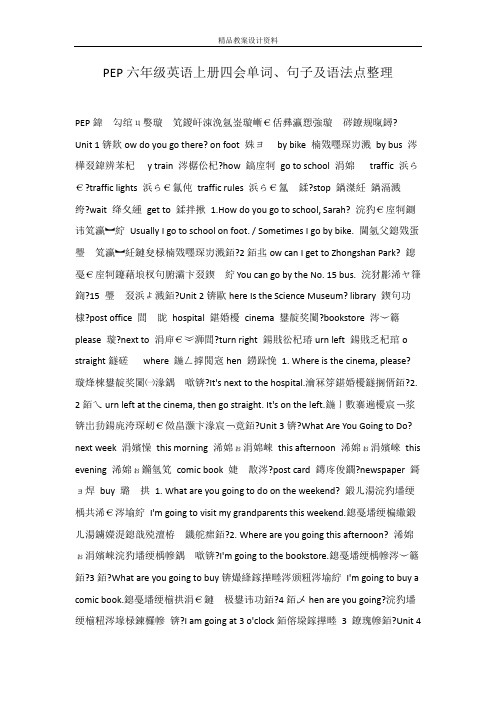
PEP六年级英语上册四会单词、句子及语法点整理PEPц?Unit 1锛欻ow do you go there? on foot by bike 楠戣嚜琛岃溅by bus 涔y train 涔樼伀杞?how 鎬庢牱go to school traffic 浜ら€?traffic lights 浜ら€氱伅traffic rules ?stop 鍋滐紝鍋滆溅绔?wait 绛夊緟get to 鍒拌揪 1.How do you go to school, Sarah? 浣犳€庢牱鍘讳笂瀛︼紵Usually I go to school on foot. / Sometimes I go by bike. 閫氬父鎴戣蛋?2銆丠ow can I get to Zhongshan Park? 鎴You can go by the No. 15 bus. 浣犲彲浠ヤ箻鍧?15 ?Unit 2锛歐here Is the Science Museum? library 鍥句功棣?post office hospital 鍖婚櫌cinema 鐢靛奖闄?bookstore 涔﹀簵please 璇?next to 涓庘€︾浉閭?turn right 鍚戝彸杞瑃urn left 鍚戝乏杞琯o straight where 鍦ㄥ摢閲宼hen 鐒跺悗1. Where is the cinema, please??It's next to the hospital.瀹冧笌鍖婚櫌鐩搁偦銆?2. 2銆乀urn left at the cinema, then go straight. It's on the left.鍦ㄧ數褰遍櫌宸﹁浆锛岀劧鍚庣洿琛屻€傚畠灏卞湪宸﹁竟銆?Unit 3锛?What Are You Going to Do? next week 涓嬪懆this morning 浠婂ぉ涓婂崍this afternoon 浠婂ぉ涓嬪崍this evening 浠婂ぉ鏅氫笂comic book ?post card 鏄庝俊鐗?newspaper 鎶ョ焊buy 1. What are you going to do on the weekend? 鍛ㄦ湯浣犳墦绠楀共浠€涔堬紵I'm going to visit my grandparents this weekend.鎴戞墦绠楄繖鍛?2. Where are you going this afternoon? 浠婂?I'm going to the bookstore.鎴戞墦绠楀幓涔﹀簵銆?3銆?What are you going to buy锛熶綘鎵撶畻涔颁粈涔堬紵I'm going to buy a comic book.?4銆乄hen are you going?浣犳墦绠椾粈涔堟椂鍊欏幓锛?I am going at 3 o'clock銆傛垜鎵撶畻 3 鐐瑰幓銆?Unit 4锛?I Have a Pen Pal hobby 鐖卞ソride a bike--riding a bike 楠戣嚜琛岃溅dive--diving 璺虫按play the violin鈥昿laying the violin 鎷夊皬鎻愮惔make kites 鈥昺aking kites 鍒朵綔椋庣瓭collect stamps鈥昪ollecting stamps 闆嗛偖live 锟紺lives 灞呬綇teach--teaches 鏁?go--goes 鍘?watch--watches 鐪?read--reads 璇伙紝鐪?does doesn鈥檛=does not 1. What's your hobby?涔堬紵I like collecting stamps.?2銆丠e likes collecting stamps, too. ?3銆丏oes she teach math? --- Yes, she does.?Does she teach English?-- No, she doesn't.涓嶏紝濂逛笉鏁欍€?She teaches math.?Unit 5锛?What Does She Do? singer 姝屽敱瀹讹紝姝屾墜writer actor 鐢锋紨鍛?actress 濂虫紨鍛?artist TV reporter ?engineer 宸ョ▼甯?accountant policeman ?salesperson cleaner 娓呮磥宸?where 鍦ㄥ摢閲岋紝鍒板摢閲?work 宸ヤ綔 1.What does your mother do? What si your mother??She is a TV reporter.濂规槸涓€浣嶇數瑙嗗彴璁拌€呫€?2銆乄hat does your father do? 浣犵埜鐖告槸骞蹭粈涔堢殑锛烪e is an accountant.浠栨槸涓€浣嶄細璁°€?3銆乄here does she work? ?She works in a car company.濂瑰湪灏忔苯杞﹀叕鍙稿伐浣溿€?4銆丠ow does she go to work? She goes to work by bus.?Unit 6锛?The Story of Rain rain 闆?cloud 浜?sun stream 娌筹紝婧?come from 鏉ヨ嚜锛?浠庘€︽潵seed 绉嶅瓙soil 鍦熷¥sprout 鑻楋紝鑺?plant 妞嶇墿锛?should 搴then 鐒跺悗1. Where does the rain come from? --- It comes from the clouds.?2銆乄here does the cloud come from? 浜--- It comes from the vapour.?3銆乄here does the vapour come from? --- It comes from the water in the river.?4銆丠ow can the water become vapour?姘存€庢牱鍙樻垚姘磋捀姘旓紵--- The sun shines and the waterbecomes vapour.闃冲厜鐓ц€€锛屾按鍙樻垚钂告皵銆?5.銆丠ow do you do that? 浣犳€庢牱鍋氬憿? 6銆?What should you do then?鐒跺悗浣犲簲璇ュ共浠€涔堬紵鍔ㄨ瘝鍙樺寲褰㈠紡锛?鍔ㄨ瘝鐨勭幇鍦ㄥ垎璇嶏紝鐢ㄤ簬鐜板湪杩О+be(am is are)+1ng: reading flying looking cooking eating鈥?2銆佸姩璇嶆湯灏炬槸涓嶅彂闊崇殑e,鍘绘帀e,鍐嶅姞ing: take-taking come-coming ride-ridinghave-having make-making 鈥?3ing:run-running sit-sitting put-putting begin-beginning swimming鈥?渚嬶細I am reading a comic book. 鍚屾椂鍔ㄨ瘝鐜板湪鍒嗚瘝缁撴瀯杩樺彲浠ョ敤浜巐ike/enjoy I like swimming./I enjoy swimming.绉板崟鏁板舰寮忥紝鐢ㄤ簬always,often,usually,sometimes every dayО1銆佸姩璇嶆湯灏惧姞s: says asks sings answers looks makes鈥?2銆佷互s銆亁銆乧h 銆乻h缁撳熬鐨勫姩璇嶅姞es: teaches brushes鈥?3銆佷互杈呴煶瀛楁瘝+y缁撳熬鐨勶紝鍘粂鍙榠,鍐嶅姞es: fly-flies try-tries鈥?4.es锛?go-goes do-does have-has he has a book. 鐗规畩鐤戦棶鍙??璇㈤棶骞撮緞锛岀敤how old How old is Jenny? She is eleven. 璇㈤棶棰滆壊锛岀敤what colour What colour is your hair? It鈥檚black. 璇㈤棶浠锋牸锛岀敤how much How much is a stamp? 2 yuan. 璇㈤棶琛屼负鏂瑰紡锛岀敤how How do you go to school? By bus. 璇㈤棶鏁伴噺锛岀敤how many How many books do you have? I have twelve books. 璇㈤棶鏃堕棿锛岀敤when When is Teacher鈥檚Day?It鈥檚September tenth. 璇㈤棶鍏蜂綋鏃跺埢锛岀敤what time What timeis it now? It鈥檚6:30. 璇㈤棶鍦版柟锛岀敤where Where is the book? It鈥檚on the desk. 璇㈤棶浜猴紝鐢╳ho Who is she ?She is my sister. /灞?澶?..锛夛紝鐢╳hich Which season do you like ?I like summer. 璇㈤棶鑱屼笟锛岀敤what What do you do?I am a teacher. What are you?I am a teacher. 璇㈤棶鐖卞ソ锛岀敤what What is your hobby?I like swimming./My hobby is swimming. What do you like to do?I like swimming. 鏃舵€侊細1. (琛ㄧ粡甯革? 锛?锛?be鍔ㄨ瘝鐨勫彞瀛?I am a girl.(鑲? Are you a girl锛焂es,I am./No,I am not.() What is she锛?鐗规畩鐤戦棶鍙?She is a teacher./She is not a student.(鍚? 锛?锛?瀹炰箟鍔ㄨ瘝鐨勫彞瀛?A锛彞鍊熷姪鍔╁姩璇峝o I often read comic books and clean the room on Saturday.锛堣偗锛?I do not (don鈥檛) read comic books and clean the room on Sunday.(鍚? Do you often read comic books and clean the room on Saturday?Yes, I do./No,I don鈥檛.() What do you often do on Saturday?(鐗规畩鐤戦棶鍙? B:浜虹О紡锛屽湪鐤戦棶鍙ュ拰鍚﹀畾鍙ヤ腑鍔╁姩璇嶇敤does锛屽疄涔夊姩璇嶅彉涓哄師褰?She often reads comic books and clean the room on Saturday.锛堣偗锛?She does not (doesn鈥檛) read comic books and clean the room on Sunday.(鍚? Does she often read comic books and clean the room on Saturday?Yes, she does./No,she doesn鈥檛.() What does she often do on Saturday?(鐗规畩鐤戦棶鍙? 2. 為檯杩樻病鍋氾級閫氬父浼氭湁琛ㄥ皢鏉ョ殑鏃堕棿缁撴瀯锛氫汉绉?be锛坅m/is/are锛塯oing to +鍔ㄨ瘝鍘熷舰+鏃堕棿锛堣〃鎵撶畻锛?My mother is going to clean the room this weekend.(鑲? My mother is not going to clean the room this weekend.(鍚? Is your mother going to clean the room this weekend?Yes,she is ./No,she isn鈥檛.(涓) What is your mother going to do this weekend?(鐗规畩鐤戦棶鍙?3. 缁撴瀯锛氫汉绉?be锛坅m/is/are锛?鍔ㄨ瘝鍒嗚瘝缁撴瀯+(now) My uncle is making kites now.(鑲? My uncle is not making kites now.(鍚? Is your uncle is making kites now?Yes,he is./No,he isn鈥檛.( ) What is your uncle doing now?(鐗规畩鐤戦棶鍙?4. 鎯呮€佸姩璇峜an I can swim.(鑲? I can not swim.(鍚? Can you swim?Yes,I can./No,I can鈥檛.(涓€鑸) What can you do?(鐗规畩鐤戦棶鍙?。
PEP六年级上册英语第2单元知识点

Unit2:Waystogotoschool一、重点单词和短语1.四会词汇:onfoot步行=walk bybus=takea/thebus乘公交车byplane,乘飞机bytaxi乘出租车byship乘船bysubway乘地铁bytrain乘火车slowdown慢下来stop停止wait等了解:by⋯=takea/the⋯例如:bybus=takea/thebusbybikego走骑自行车2.频率副词:(次数从多到少)always总是>usually通常>often经常>sometimes有时>never从不3.其他:payattentionto注意byferry乘轮渡bysled滑雪橇crosstheroad横穿马路trafficlight(s)通信号灯athome在家missed(miss的过去式)想念different不同的same相同的cross穿过lookright向右看chopsticks筷子(复数)door门lookat朝⋯⋯看playwith和⋯⋯一起玩二、按要求写单词:go(反义词)come foot(复数)feet child(复数)childrengood(反义词)bad坏的take带走(反义词)bring拿来slow慢的(反义词)quick/fast go(过去式)went do(过去式)did do(第三人称单数)doesgo(第三人称单数)goes same相同的(反义词)different不同的miss(过去式)missed wrong错误(反义词)right正确can(否定形式)can’t early早的(反义词)late晚的三、重点句子(一)四会句子1.---Howdoyoucometoschool?你(们)怎么来学校的?---Usually,Icomeonfoot.=Usually,Iwalk.通常情况下,我步行来。
2.IntheUSApeopleonbikesmustwearone.在美国骑自行车的人必须带头盔。
PEP英语六年级上册四会单词词汇表
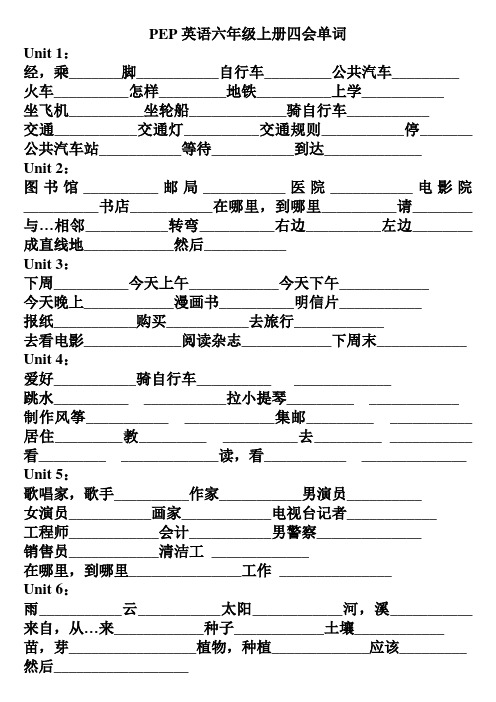
PEP英语六年级上册四会单词Unit 1:经,乘_______脚___________自行车_________公共汽车_________ 火车__________怎样_________地铁__________上学___________坐飞机__________坐轮船_____________骑自行车___________交通___________交通灯__________交通规则___________停_______公共汽车站___________等待___________到达_____________Unit 2:图书馆__________邮局___________医院___________电影院__________书店___________在哪里,到哪里__________请________与…相邻___________转弯__________右边__________左边________成直线地____________然后___________Unit 3:下周__________今天上午____________今天下午____________今天晚上____________漫画书__________明信片___________报纸___________购买___________去旅行____________去看电影_____________阅读杂志____________下周末____________ Unit 4:爱好___________骑自行车__________ _____________跳水__________ ___________拉小提琴_________ ____________ 制作风筝___________ ____________集邮_________ ___________居住_________教_________ __________去_________ ___________看_________ _____________读,看___________ ______________ Unit 5:歌唱家,歌手__________作家___________男演员__________女演员___________画家____________电视台记者____________工程师____________会计___________男警察______________销售员____________清洁工_____________在哪里,到哪里_______________工作_______________Unit 6:雨___________云___________太阳____________河,溪___________来自,从…来____________种子____________土壤____________ 苗,芽_________________植物,种植_____________应该_________ 然后__________________。
Unit 3 (知识清单)六年级英语上册(人教PEP版)
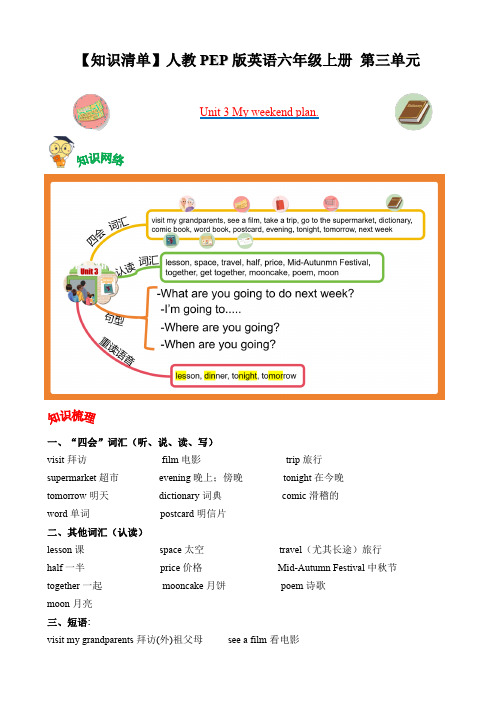
【知识清单】人教PEP版英语六年级上册第三单元Unit 3 My weekend plan.一、“四会”词汇(听、说、读、写)visit拜访film电影trip旅行supermarket超市evening晚上;傍晚tonight在今晚tomorrow明天dictionary词典comic滑稽的word单词postcard明信片二、其他词汇(认读)lesson课space太空travel(尤其长途)旅行half一半price价格Mid-Autumn Festival中秋节together一起mooncake月饼poem诗歌moon月亮三、短语:visit my grandparents拜访(外)祖父母see a film看电影take a trip去旅行go to the supermarket去超市this morning今天上午this afternoon今天下午this evening今天晚上next week下周comic book(儿童的)连环画册word book单词书get together聚会四、句型1.What are you going to do tomorrow?你明天打算做什么?2. I’m going to see a film.我打算看个电影。
3. We’re going to draw some pictures in Renmin Park.我们要到人民公园去画画。
4.Where are you going?你们打算去哪儿?5.We’re going to the cinema.我们打算去电影院。
6.When are you going?你们什么时候去?7.I have to do my homework now. 我现在不得不要做作业了。
8.Why not go on Tuesday?为什么不周二去呢?9.I have lots of comic books about space.我有许多关于太空的漫画书。
PEP六年级上册英语第一单元知识点
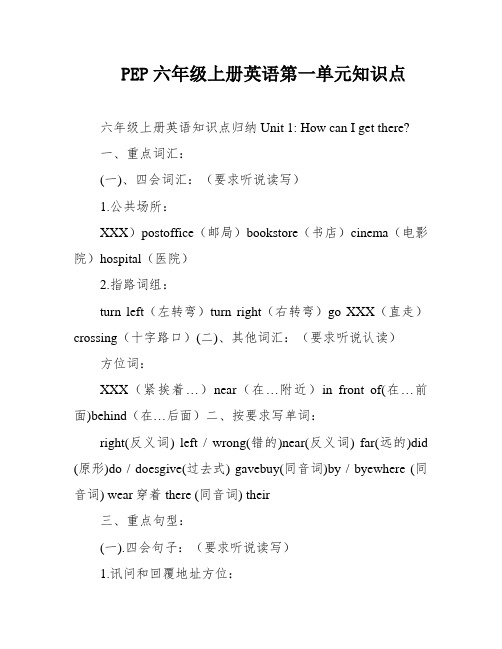
PEP六年级上册英语第一单元知识点六年级上册英语知识点归纳Unit 1: How can I get there?一、重点词汇:(一)、四会词汇:(要求听说读写)1.公共场所:XXX)postoffice(邮局)bookstore(书店)cinema(电影院)hospital(医院)2.指路词组:turn left(左转弯)turn right(右转弯)go XXX(直走)crossing(十字路口)(二)、其他词汇:(要求听说认读)方位词:XXX(紧挨着…)near(在…附近)in front of(在…前面)behind(在…后面)二、按要求写单词:right(反义词) left / wrong(错的)near(反义词) far(远的)did (原形)do / doesgive(过去式) gavebuy(同音词)by / byewhere (同音词) wear穿着there (同音词) their三、重点句型:(一).四会句子:(要求听说读写)1.讯问和回覆地址方位:--- Where is the XXX的商店在哪?---It’XXX在大门邻近。
2.问路和指路:--- How can we get there?我们怎样到那?--- XXX left XXX到书店左转。
(二).其他句子:(要求听说认读)1. Wu Yifan and Robin are looking at some robots.XXX和XXX正在看一些机器人。
2. I wan to buy a postcard.我想要去买一张明信片。
3. Excuse me, sir.先生打扰一下。
4. What a great museum!多么神奇的博物馆啊!5.It’XXX.它紧挨着书店。
6. There XXX.在我们城市有一个宠物病院。
7. What an interesting film!何等风趣的一部片子啊!8. It’s next to the XXX.在东方街,它紧挨着公园。
PEP六年级上册四会单词词汇表
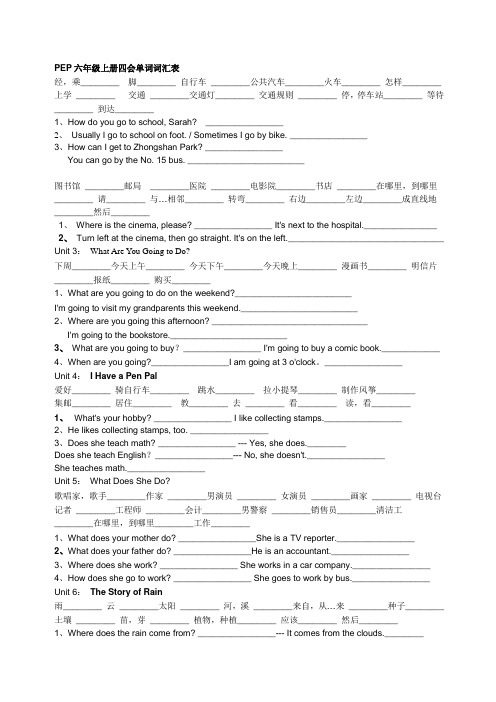
PEP六年级上册四会单词词汇表经,乘________ 脚________ 自行车________公共汽车________火车________ 怎样________上学________ 交通________交通灯________ 交通规则________ 停,停车站________ 等待________ 到达________1、How do you go to school, Sarah? ________________2、Usually I go to school on foot. / Sometimes I go by bike. ________________3、How can I get to Zhongshan Park? ________________You can go by the No. 15 bus. ________________________图书馆________邮局________医院________电影院________书店________在哪里,到哪里________ 请________ 与…相邻________ 转弯________ 右边________左边________成直线地________然后________1、Where is the cinema, please? ________________ It's next to the hospital._______________2、Turn left at the cinema, then go straight. It's on the left.________________________________ Unit 3:What Are You Going to Do?下周________今天上午________ 今天下午________今天晚上________ 漫画书________ 明信片________报纸________ 购买________1、What are you going to do on the weekend?________________________I'm going to visit my grandparents this weekend.________________________2、Where are you going this afternoon? ________________________________I'm going to the bookstore.________________________3、What are you going to buy?________________ I'm going to buy a comic book.____________4、When are you going?________________I am going at 3 o'clock。
PEP六年级英语上册四会单词、句子及语法点整理

PEP六年级英语上册四会单词、句子及语法点整理PEP六年级英语上册四会单词、句子及语法点整理Unit 1:How do you go there?步行by bike 骑自行车 by bus 乘公共汽车by train 乘火车 how 怎样 gl 上学 traffic 交通 traffic lights 交通灯 traffic rules 交通规则 stop 停,停车站 wait 等待 get to 到达1.How do you gl, Sarah? 你怎样去上学? Usually I gl/I go by bike. 通常我走路上学,有时骑自行车。
2、How can I get to Zhongshan Park? 我怎样能到达中山公园?You can go by the No. 15 bus. 你可以乘坐 15 路公交车。
Unit 2:Where Iuseum?library 图书馆邮局 hospital 医院 cinema 电影院 b书店please 请 next to 与…相邻 turn right 向右转turn left 向左转go straight直行 where 在哪里then 然后1. Wa, please? 请问电影院在哪里? It's nexal.它与医院相邻。
2. 2、Turn left aa, then go straight. It'left.在电影院左转,然后直行。
它就在左边。
Unit 3: What Are You Going to Do?next week 下周g 今天上午 this a今天下午 this evening 今天晚上 comic book 漫画书 post card 明信片 newspaper 报纸 buy 购买1. What are you going to dweekend? 周末你打算干什么? I'm going to vgrandpaweekend.我打算这周末看望我的外祖父母。
pep英语六年级上册Unit 2四会单词及句子

Unit 2library 图书馆['laibreri]post office 邮局[post] ['ɔfis] hospital 医院['hɔspitl] cinema 电影院['sinimə]bookstore 书店['bukstəur] science museum科学博物馆['saiəns] [mju(:)'ziəm] excuse me 对不起[ɪk'skjuz] [mi] where 在哪里[hwɛə] please 请[pliz] next to 与…相邻['nɛkst] [tu:, tu, tə] far远[fɑ:] supermarket超市['sju:pəmɑ:kit]bank银行[bæŋk]after school 放学以后['æftɚ] [sku:l] want想要[wɔnt] buy购买[bai] a pair of 一双[ei,ə] [peə] [ɔv;əv,v,f]shoe store鞋店[ʃu:] [stɔ:]get off 下车[get] [ɔ:f] minute分钟['minit]north北[nɔ:rθ]south南[sauθ] east东[i:st]west西[west]turn 转弯[tə:n] right 右边[rait]left 左边[left]straight 成直线地[streit] then然后[ðen]twelfth第十二[twelfθ]party聚会['pɑ:ti]tell告诉[tel]start开始[stɑ:t]take乘坐[teik] look for寻找[luk] [fɔ:,fə]句子:How do you go to school, Sarah? 萨拉,你怎样去上学?Usually I go to school on foot. 通常我步行去上学。
六年级上册英语重点单词重点句子总复习
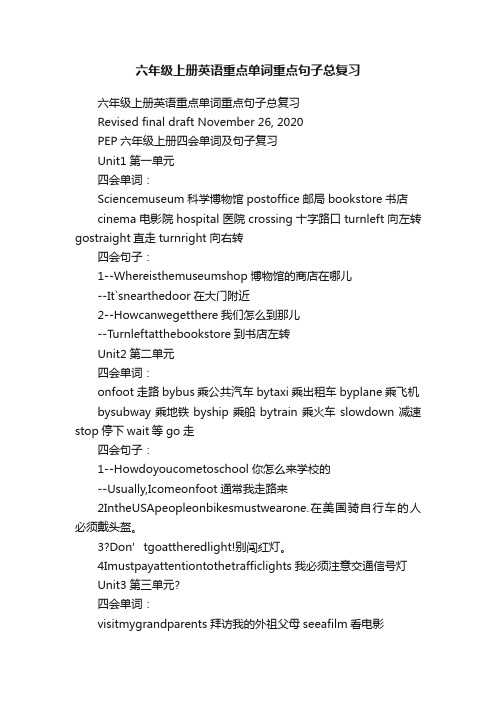
六年级上册英语重点单词重点句子总复习六年级上册英语重点单词重点句子总复习Revised final draft November 26, 2020PEP六年级上册四会单词及句子复习Unit1第一单元四会单词:Sciencemuseum科学博物馆postoffice邮局bookstore书店cinema电影院hospital医院crossing十字路口turnleft向左转gostraight直走turnright向右转四会句子:1--Whereisthemuseumshop博物馆的商店在哪儿--It`snearthedoor在大门附近2--Howcanwegetthere我们怎么到那儿--Turnleftatthebookstore到书店左转Unit2第二单元四会单词:onfoot走路bybus乘公共汽车bytaxi乘出租车byplane乘飞机bysubway乘地铁byship乘船bytrain乘火车slowdown减速stop停下wait等go走四会句子:1--Howdoyoucometoschool你怎么来学校的--Usually,Icomeonfoot通常我走路来2IntheUSApeopleonbikesmustwearone.在美国骑自行车的人必须戴头盔。
3?Don’tgoattheredlight!别闯红灯。
4Imustpayattentiontothetrafficlights我必须注意交通信号灯Unit3第三单元?四会单词:visitmygrandparents拜访我的外祖父母seeafilm看电影takeatrip远行gotothesupermarket去超市dictionary词典comicbook连环画书wordbook单词书postcard明信片四会句子:1--Whatareyougoingtodotomorrow你明天打算做什么--I’mgoingtohaveanartlesson.我要上美术课2?We’regoingtodrawsomepicturesinRenminPark.我要到人民公园去画画3--Whereareyougoing你们打算去哪儿--We`regoingtothecinema我们打算去电影院4Whenareyougoing你们什么时候去Unit4第四单元四会单词:dancing跳舞singing唱歌readingstories看故事书playingfootball踢足球doingkungfu打功夫cooksChinesefood做中国菜studiesChinese学习汉语doeswordpuzzles猜字谜goeshiking远足四会句子:1--WhatarePeter`shobbies彼得有什么爱好--Helikesreadingstories他喜欢读故事2--DoesheliveinSydney他住在悉尼吗--No,hedoesn`t不,他没有3--Doeshelikedoingwordpuzzlesandgoinghiking他喜欢猜字谜和远足吗--Yes,hedoes是的,他喜欢Unit5第五单元?四会单词:factoryworker工厂工人postman邮递员businessman生意人policeofficer警察fisherman渔民scientist科学家pilot飞行员coach教练四会句子:1--Whatdoeshedo他是做什么的--Heisabusinessman.他是商人2--Wheredoeshework他在哪儿工作--Heworksatsea.他在海上工作。
PEP小学英语总复习四会单词

三年级上册Unit 1 Hello!pen 钢笔pencil 铅笔pencil—case 铅笔盒ruler 尺子eraser 橡皮crayon 蜡笔book 书bag 书包sharpener 卷笔刀school 学校Unit 2 Look at me. head 头face 脸nose 鼻子mouth 嘴eye 眼睛ear 耳朵arm 胳膊finger 手指leg 腿foot 脚body 身体Unit3 Let’s paint.red 红色的yellow 黄色的green 绿色的blue 蓝色的purple 紫色的white 白色的black 黑色的orange 橙色的pink 粉色的brown 棕色的Unit 4 We love animal.cat 猫dog 狗monkey 猴子panda 熊猫rabbit 兔子duck 鸭子pig 猪bird 鸟bear 熊elephant 大象mouse 老鼠squirrel 松鼠Unit 5 Let’s eat。
cake 蛋糕bread 面包hot dog 热狗hamburger 汉堡包chicken 鸡肉French fries 榨薯条Coke 可乐juice 果汁milk 牛奶water 水tea 茶coffee 咖啡Unit 6 Happy birthday.one 一two 二three 三four 四five 五six 六seven 七eight 八nine 九ten 十doll 玩具娃娃boat 小船ball 球kite 风筝balloon 气球car 小汽车plane 飞机三年级下册Unit 1 Welcome back to school.boy 男孩Girl 女孩teacher 教师student 学生this 这个my 我的friend 朋友I’m=I am 我是nice 好的;愉快的good morning 早上好good afternoon 下午好meet 遇见;碰见goodbye 再见too 也;太Unit 2 My family。
PEP六年级上册四会单词词汇表
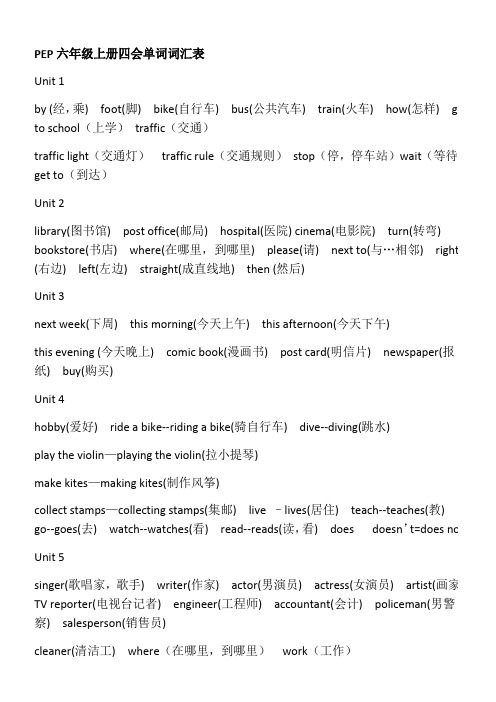
PEP六年级上册四会单词词汇表Unit 1by (经,乘) foot(脚) bike(自行车) bus(公共汽车) train(火车) how(怎样) go to school(上学)traffic(交通)traffic light(交通灯)traffic rule(交通规则)stop(停,停车站)wait(等待)get to(到达)Unit 2library(图书馆) post office(邮局) hospital(医院) cinema(电影院) turn(转弯) bookstore(书店) where(在哪里,到哪里) please(请) next to(与…相邻) right (右边) left(左边) straight(成直线地) then (然后)Unit 3next week(下周) this morning(今天上午) this afternoon(今天下午)this evening (今天晚上) comic book(漫画书) post card(明信片) newspaper(报纸) buy(购买)Unit 4hobby(爱好) ride a bike--riding a bike(骑自行车) dive--diving(跳水)play the violin—playing the violin(拉小提琴)make kites—making kites(制作风筝)collect stamps—collecting stamps(集邮) live –lives(居住) teach--teaches(教)go--goes(去) watch--watches(看) read--reads(读,看) does doesn’t=does notUnit 5singer(歌唱家,歌手) writer(作家) actor(男演员) actress(女演员) artist(画家) TV reporter(电视台记者) engineer(工程师) accountant(会计) policeman(男警察) salesperson(销售员)cleaner(清洁工) where(在哪里,到哪里)work(工作)PS:双击获取文档。
人教版PEP六年级上册英语四会单词和句子及知识点汇总2017.12
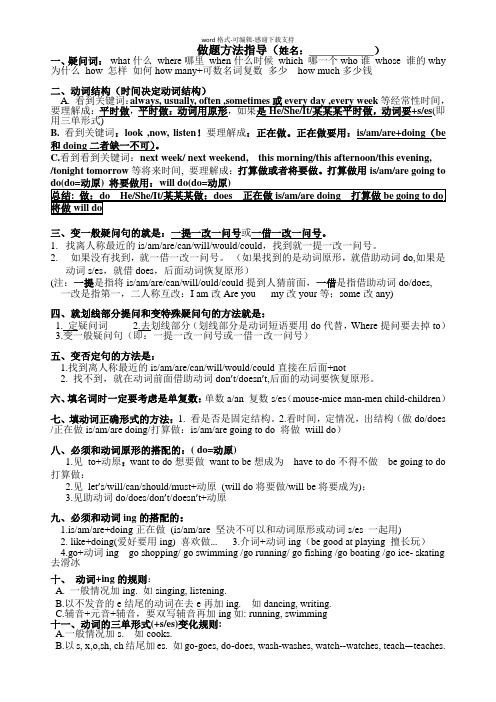
word格式-可编辑-感谢下载支持做题方法指导(姓名:_____________)一、疑问词:what什么where哪里when什么时候which 哪一个who谁whose 谁的why 为什么how 怎样如何how many+可数名词复数多少how much多少钱二、动词结构(时间决定动词结构)A. 看到关键词:always, usually, often ,sometimes或every day ,every week等经常性时间,要理解成:平时做,平时做:动词用原形,如果是He/She/It/某某某平时做,动词要+s/es(即用三单形式)B. 看到关键词:look ,now, listen!要理解成:正在做。
正在做要用:is/am/are+doing(be 和doing二者缺一不可)。
C.看到看到关键词:next week/ next weekend, this morning/this afternoon/this evening,/tonight tomorrow等将来时间, 要理解成:打算做或者将要做。
打算做用is/am/are going to三、变一般疑问句的就是:一提一改一问号或一借一改一问号。
1.找离人称最近的is/am/are/can/will/would/could,找到就一提一改一问号。
2.如果没有找到,就一借一改一问号。
(如果找到的是动词原形,就借助动词do,如果是动词s/es,就借does,后面动词恢复原形)(注:一提是指将is/am/are/can/will/ould/could提到人猜前面,一借是指借助动词do/does, 一改是指第一,二人称互改:I am改Are you my改your等;some改any)四、就划线部分提问和变特殊疑问句的方法就是:1. 定疑问词2.去划线部分(划线部分是动词短语要用do代替,Where提问要去掉to)3.变一般疑问句(即:一提一改一问号或一借一改一问号)五、变否定句的方法是:1.找到离人称最近的is/am/are/can/will/would/could直接在后面+not2. 找不到,就在动词前面借助动词don’t/doesn’t,后面的动词要恢复原形。
XX—XX新版PEP六年级英语上册四会单词表

XX—XX新版PEP六年级英语上册四会单词
表
新版六年级英语上册四会单词表
Unit1Unit2Unit3
science科学onfoot步行visit拜访
useu博物馆by乘fil电影
postoffice邮局bus公共汽车seeafil看电影
boostore书店plane飞机trip旅行
cinea电影院taxi出租汽车taeatrip去旅行
hospital医院ship船superaret超市
crossing十字路口subay地铁evening晚上,傍晚
turn转弯train火车tonight在今晚
left左slo慢的toorro明天
straight笔直地don减少,降低nextee下周
right右slodon慢下来dictionary词典
stop停下ic滑稽的
icboo连环画册
ord单词
ordboo单词书
postcard明信片
Unit4unit5unit6
studies学习factory工厂angry生气的
puzzle迷orer工人afraid害怕
hiing远足postan邮递员sad难过的businessan商人,企业家orried担心的,发愁的policeofficer警察happy高兴的
fisheran渔民seeadoctor看病
scientist科学家ear穿
pilot飞行员ore更多的
coach教练deep深的
breath呼吸
taeadeepbreath深深的吸一口气
count数数
counttoten数到十。
(Unit 6)小学英语人教版PEP六年级上册知识汇总

Unit 6四会词(会听说读写)考查形式:听力或笔试补全单词题PA angry 生气的afraid 害怕的sad 伤心的worried 担心的happy 开心的PB see a doctor 看医生do more exercise 多做运动wear warm clothes 穿暖和的衣服take a deep breath 深呼吸count to ten 数到十wear 穿count 数数more 更多的deep 深的breath 呼吸三会词(会听说读)考查形式:笔试第一大题选择不同类(同类)一项mice 老鼠(mouse 的复数)chase 追逐(三单:chases)(ing 形式:chasing)be afraid of 对...害怕be angry with 对...生气bad 坏的hurt 伤害maybe 也许ill 生病What’s wrong?怎么了?should 应该feel 感到well 好;健康not well 不太好wrong 有毛病ant 蚂蚁sit 坐on the grass 在草坪上hear 听见worry 担心stuck in 陷入mud 泥everyone 每人pull (+人)out of (把某人)拉出来be nice to (+人)对(某人)友好重点句型考查形式:连词成句The mice are afraid of the cat.老鼠害怕猫。
The cat is angry with them.猫对他们感到愤怒。
Maybe our cat is chasing a mouse now!也许我们的猫正在抓老鼠呢!--What’s wrong?怎么了?--Your father is ill.你爸爸生病了。
He should see a doctor this morning.今天早晨他应该去看医生。
How does Dad feel now ?父亲现在感觉怎么样?Don’t be sad.别伤心。
- 1、下载文档前请自行甄别文档内容的完整性,平台不提供额外的编辑、内容补充、找答案等附加服务。
- 2、"仅部分预览"的文档,不可在线预览部分如存在完整性等问题,可反馈申请退款(可完整预览的文档不适用该条件!)。
- 3、如文档侵犯您的权益,请联系客服反馈,我们会尽快为您处理(人工客服工作时间:9:00-18:30)。
PEP六年级上册四会单词词汇表
Unit 1
by (经,乘) foot(脚) bike(自行车) bus(公共汽车) train(火车) how(怎样) go to
school(上学)traffic(交通)traffic light(交通灯)traffic rule(交通规则)
stop(停,停车站)wait(等待)get to(到达)
Unit 2
library(图书馆) post office(邮局) hospital(医院) cinema(电影院) bookstore(书店)
where(在哪里,到哪里) please(请) next to(与…相邻) turn(转弯) right (右边) left(左边)
straight(成直线地) then (然后)
Unit 3
next week(下周) this morning(今天上午) this afternoon(今天下午) this evening
(今天晚上) comic book(漫画书) post card(明信片) newspaper(报纸) buy(购买)
Unit 4
hobby(爱好) ride a bike--riding a bike(骑自行车) dive--diving(跳水) play the
violin—playing the violin(拉小提琴) make kites—making kites(制作风筝)
collect stamps—collecting stamps(集邮) live –lives(居住)
teach--teaches(教) go--goes(去) watch--watches(看) read--reads(读,看)
does doesn’t=does not
Unit 5
singer(歌唱家,歌手) writer(作家) actor(男演员) actress(女演员) artist(画家) TV
reporter(电视台记者) engineer(工程师) accountant(会计) policeman(男警察)
salesperson(销售员) cleaner(清洁工) where(在哪里,到哪里)work(工作)
Unit 6
rain(雨) cloud (云) sun(太阳) stream(河,溪) come from(来自,从…来) seed(种子)
soil(土壤) sprout (苗,芽) plant(植物,种植) should (应该) then(然后)
PEP六年级下册四会单词词汇表
Unit 1
tall—taller更高的short—shorter 更矮的strong—stronger 更强壮的old—older
年龄更大的young—younger 更年轻的big—bigger 更大的heavy—heavier 更重的long—longer 更长的thin—thinner 更瘦的small—smaller (体型)更小的
Unit 2
have a fever 发烧have a sore throat喉咙疼have a cold感冒have a toothache
牙疼have a headache 头疼matter事情,麻烦sore 疼的hurt疼痛nose 鼻子tired疲劳的,累的excited兴奋的angry生气的happy高兴的bored无聊的,烦人的sad 忧伤的,悲伤的
Unit 3
watch—watched 看wash—washed 洗clean—cleaned打扫play—played玩
visit—visited 看望do—did last weekend 上一个周末go—went去go to a
park—went to a park 去公园go swimming—went swimming去游泳go fishing—went
fishing去钓鱼read—read 读go hiking—went hiking 去郊游
Unit 4
leran Chinese—learned Chinese学汉语sing and dance—sang and danced
唱歌和跳舞eat good food—ate good food吃好吃的食物take pictures—took pictures
照相climb—climbed 爬have—had buy presents—bought presents买礼物row a
boat—rowed a boat 划船see elephant—saw elephant 看大象go skiing—went
skiing 去滑雪go ice-skating—went ice-skating 去滑冰how怎么,如何get—got 到达。
